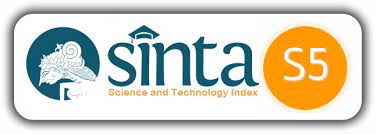PENGARUH METODE SINTESA TERHADAP PERKEMBANGAN MEMBACA ANAK USIA DINI DI TAMAN KANAK-KANAK
Abstract
The development of interest and reading habits should start as early as possible, but children's understanding of letter symbols is still low and they are not able to connect simple writing with the symbols that symbolize it, children are not yet able to connect syllables into a word. because children's curiosity about reading is very lacking, the lack of use of reading methods used by teachers at school so that learning to read is not optimal. This type of research is quantitative using quasi-experimental methods (quashi experiment). The results of the study are 1) the synthesis method influences the development of children's reading skills. 2) By using the synthesis method, it is easier for children to understand the recognition of letters and writing in developing reading skills, 3) The use of the synthesis method in learning activities can develop children's reading skills in recognizing letters and recognizing writing. The synthesis method has an effect on children's reading development and has a positive impact and there are improvements in the learning process, for this reason teachers need to use positive contributing methods and support successful learning.
References
Depdiknas. (2000). Permainan Membaca dan Menulis di TK. Jakarta : Depdiknas.
Dhieni, Nurbiana dkk. (2005). Metode Pengembangan Bahasa. Jakarta : Universitas Terbuka.
Dwi Sunar Prasetyono. (2008). Rahasia Mengajarkan Gemar Membaca pada Anak Sejak Dini. Yogyakarta: Think.
Isjoni. (2011). Model Pembelajaran Anak Usia Dini membentuk Generasi Cemerlang Harapan Bangsa. Bandung : Alfabeta.
Moh. Nasir. (2005). Metode Penelitian. Jakarta: Ghalia Indonesia.
Noorlaila, Ivo. (2010). Panduan Lengkap Mengajar PAUD. Yogyakarta: Pinus Book Publisher
Sugiyono. (2009). Metode Penelitian Pendidikan Pendekatan Kuantitatif, Kualitatif, dan R&D. Bandung : Alfabeta.
Sujiono, Yuliani Nuraini. (2009). Konsep Dasar Pendidikan Anak Usia Dini. Jakarta : PT Indeks.







.png)





